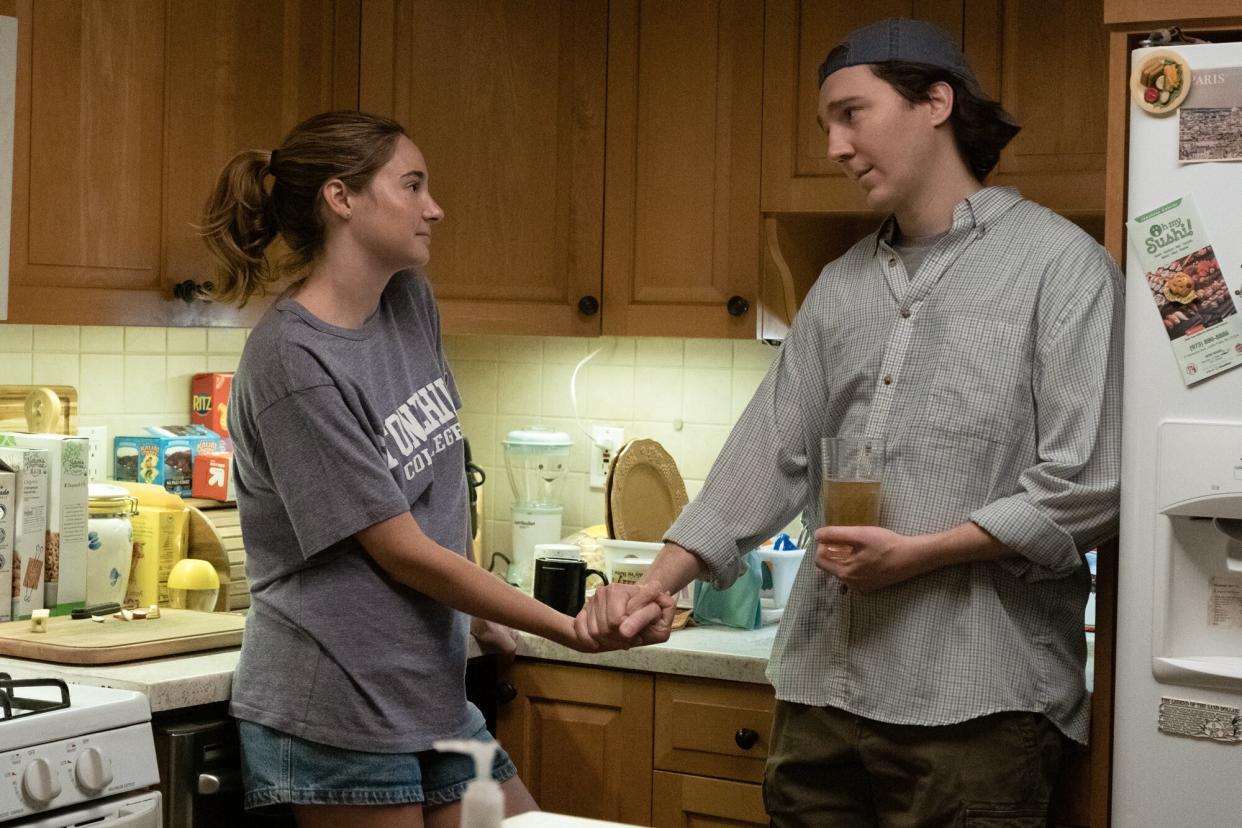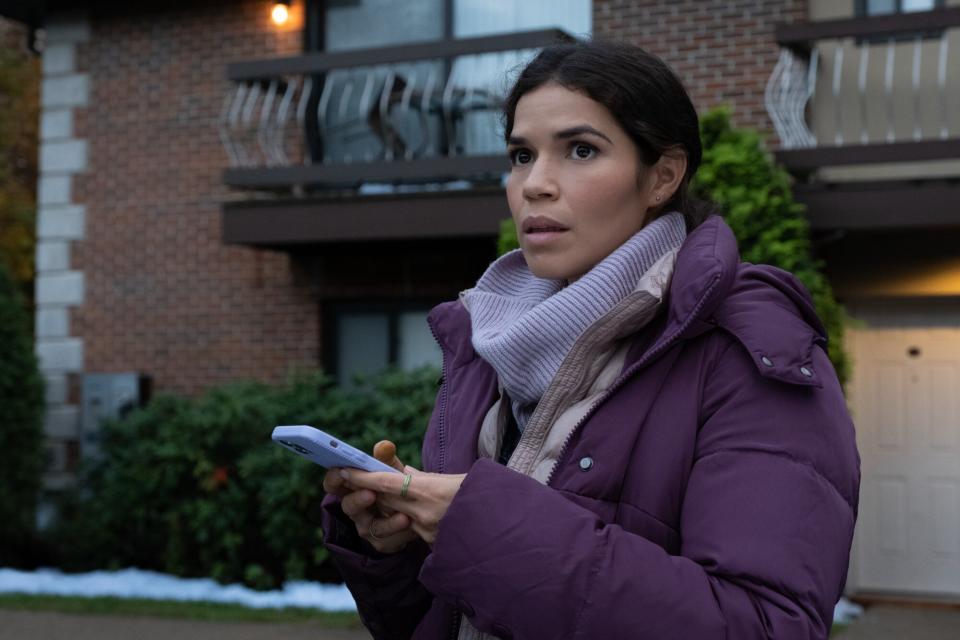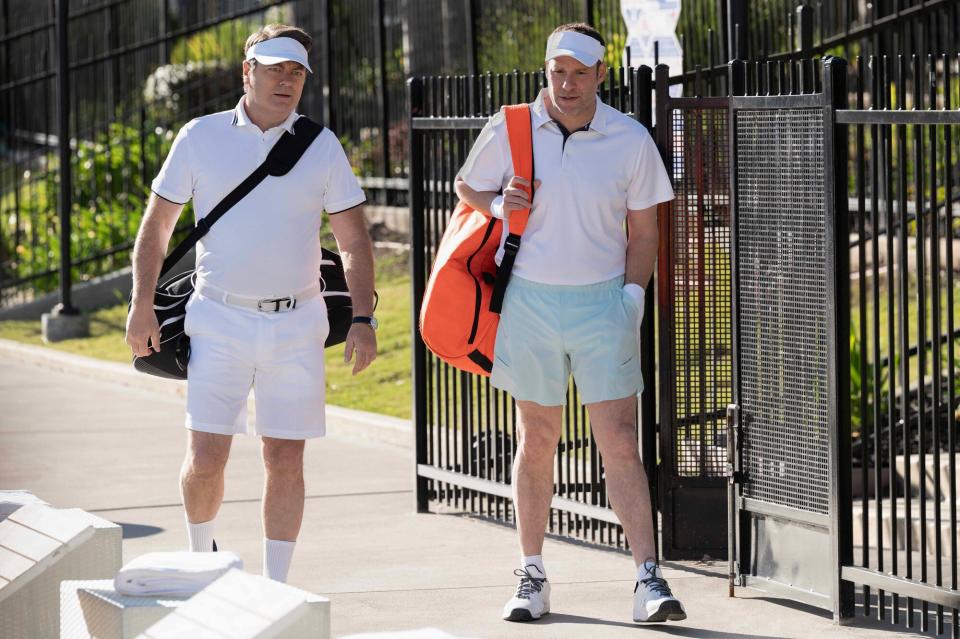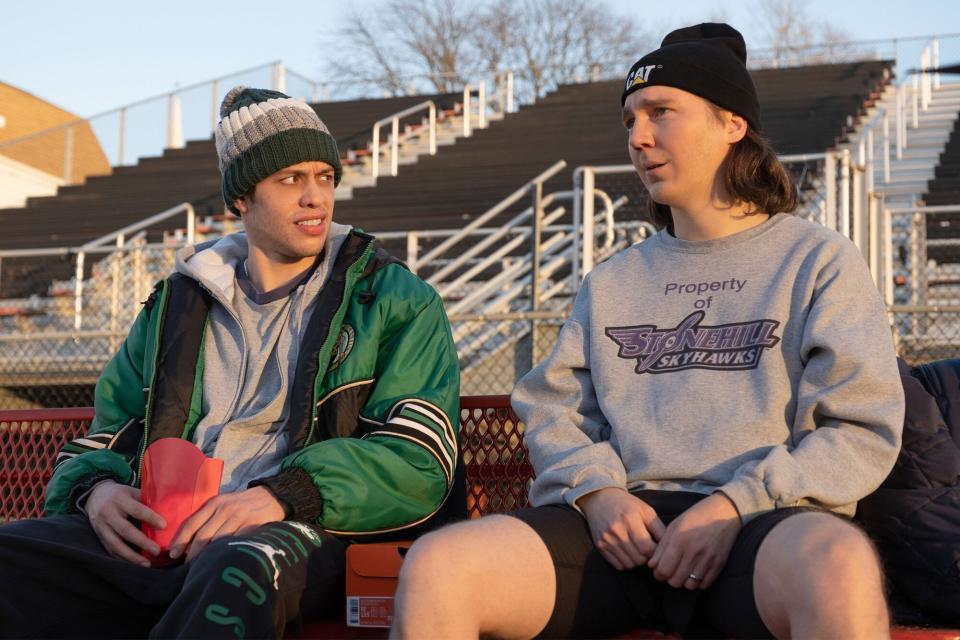“Dumb Money” director on Seth Rogen playing a finance bro and why you should be outraged by the film

- Oops!Something went wrong.Please try again later.
- Oops!Something went wrong.Please try again later.
Craig Gillespie has one barometer for whether his GameStop short squeeze dramedy Dumb Money is "working": if audiences leave the theater feeling outraged.
The synopsis alone feels primed for such a reaction — the film follows the real-life tale of Keith Gill (Paul Dano), an average-Joe Redditor and YouTuber who invests his life savings into GameStop stock and posts about it on his channels. A nationwide movement starts when his social posts and videos start blowing up, and everyday people like him flip the script on Wall Street and get rich by turning the videogame store into the world's hottest company — which goes great, until the billionaires inevitably start fighting back and a David vs. Goliath showdown emerges.
"If [the movie is] working, you should be outraged by the end of this and want change," Gillespie tells EW. "Hopefully it starts that dialogue and reinvigorates the sense of communities being able to come together and make a change and make a difference and make an impact. I hope it fans that ideology."
Written by Rebecca Angelo and Lauren Schuker Blum based on Ben Mezrich's book, The Antisocial Network, Dumb Money also stars Pete Davidson, Shailene Woodley, Seth Rogen, Nick Offerman, Vincent D'Onofrio, America Ferrera, Anthony Ramos, and more.
Ahead of the film's wide release on Sept. 29, EW spoke with Gillespie about collective outrage, the surprisingly personal reason he wanted to get involved in the film, casting Rogen and Offerman against type to play Wall Street bros, and more.

Claire Folger/ Sony Pictures Shailene Woodley and Paul Dano in 'Dumb Money'
ENTERTAINMENT WEEKLY: Between I, Tonya and Pam & Tommy (and several others), you've been on a true-life kick lately. What about this particular real-life tale caught your eye?
CRAIG GILLESPIE: Interestingly, while we were in COVID, my son was living with me, and he's 24, and he was on [the subreddit community featured in the film], r/WallStreetBets. So he was going through this journey while it was happening from very early on. He was probably on three or four months before one of the early investors, but keeping track of it and building, and then he got into that two weeks where it started getting very intense, and he'd come running downstairs and be like, "Elon Musk just tweeted GameStop, and Mark Cuban just tweeted" and just every bit, every moment as it was happening to the day of. He was in options, and he was getting up at six in the morning for the pre-market conversations, checking every three minutes when to sell, and he finally got out just at the right time and did well with it. The next day, Robinhood froze the buy options, it crashed, and that anger and the frustration and the outrage, seeing it through him, showing me what the chatter and the memes were online — I lived it firsthand.
So when you got the script...
I don't think if I hadn't have been in it with him and seen what the response was like online and what was happening with the community, I don't know honestly how interested I would've been. But then I was working with Rebecca Angelo and Lauren Schuker Blum during this and the next couple of months on another true story, Chippendales, and we talked about [Dumb Money] a lot. I was fascinated by the whole thing and curious about their script and when they were going to be done. And then the Chippendales project fell apart. The very next day, they sent [the Dumb Money script] over, and it was everything I had hoped for. Obviously it was from the perspective of the underdog and that frustration and that anger and the sense of the system being rigged, and all that emotion I'd seen firsthand was in the script and that intensity. I was immediately in.
I've seen a lot of people compare Dumb Money to The Big Short or The Social Network — how do you feel about those comparisons and what were some of your actual inspirations for the film?
[With] The Social Network, obviously there's this pressure cooker in that, and there's a way that is constructed that was interesting to us because I really wanted the pressure in this. And The Big Short is obviously about the banking community, but for us and the way that we approached this, it's about the individual. It's about this larger story of people feeling marginalized and the frustration of the wealth disparity in the country. So to be able to approach it from that outsider point of view and root for the little person in this is what was really interesting to me.

Claire Folger America Ferrera in 'Dumb Money'
It's relatable, in a very simplistic term. The stakes are so high for the individuals. It's like when you have a nurse that America Ferrera portrays, and she's up $500,000 and that's life-changing for her, there's that stress level and the moral quandary of when to get out — and with that, if she loses it, she's back to a mortgage and not being able to pay for school. So it's like, the stakes are so high and so real that you can't help but be invested as a viewer.
When I think of Nick Offerman and Seth Rogen, I think of them playing the types of characters who would have been more on the Reddit side of things, and yet here they play the billionaire finance guys. Talk to me about that decision and why they were the right fit for those parts.
It's kind of twofold. What I loved about Rebecca and Lauren's script is it's not black and white. It's gray. We try to make these characters as fully formed as possible. And I thought it was important that the banking system are the villains in this — it's the system that is at fault. And we wanted to show that there are individuals behind this. There are families, there are things that were at stake in their lives as well that are very real, [things that] show there's humanity on both sides. What I think is interesting when you watch this film, I want it to be a subjective experience, meaning that I want the audience to take something different from it, depending on their perspective. So if you're in that banking community, you're going to watch this movie very differently than if you're an everyday person who is not involved in this and frustrated by what's going on in the country. So you'll draw different parts of the film out and relate to it in different ways. That being the case, having somebody who has some humanity and accessibility like Seth was important for that role. Also, I just love when you get to have somebody play against type. So to have something that you're not expecting and to see him surprise you in those ways and really give a dramatic performance, that's always exciting to see.

Lacey Terrell/ Sony Pictures Nick Offerman and Seth Rogan in 'Dumb Money'
Were you or Paul or anyone involved in the film able to speak with the real Keith Gill?
No, but we reached out many times along the way. Early on we managed to talk to some of the family — Ben and the writers, Rebecca and Lauren, did — but never got a response from Keith and ultimately just had to respect his privacy for that. But in some ways it made us be more diligent, and they really tried to make sure that we were going to get it right. Keith posted, I think, a seven-hour video every week for a year. There's so much footage available and conversation and him talking about different things. So we would really try and draw from that, and stayed true to that, and what he did share publicly vervus what he didn't share publicly and find where that line was. I think that first post that he does in the movie is pretty much verbatim his first post that he actually did.
COVID plays a very big part in the film. At what point in the pandemic were you filming and how did it influence the final product?
We were very much in COVID when we were filming. It was still all the protocols and the testing and the masks — it wasn't a distant memory by any means. This movie is so much about COVID. Honestly, this would not have happened without COVID as a backdrop for the whole reason this transpired. It's the sense of isolation that was happening, the sense of vulnerability, of the true fear of life and death, the financial stress that everybody was under with no work, the lack of government aid — it was all building to this real sense of wealth disparity that's happening in the country that people are so frustrated by and trying to be heard with. So when this opportunity came up with buying GameStop, it was a way for them to have a mouthpiece and be heard and really sort of stick it to Wall Street and these one-percenters...well, in this case, these 0.01%-ers. It was a win-win-win.

Everett Collection Pete Davidson and Paul Dano in 'Dumb Money'
Besides COVID, what were some of the most creatively challenging parts of making this film?
Having this amount of talent, which I was so lucky to have with all of these actors, came with a very complicated scheduling situation. Paul would be doing press on The Fabelmans, and Pete had his show he was shooting simultaneously. Anthony had only three days in a whole shooting schedule that he was available. So we'd have to figure out, all right, what are we doing? How do we adapt this scene? What are we changing? And some of that inspired some of these really fun moments. One of them being, at the end of the day on our last day of shooting, we had a little bit of time and Pete was there and I said, "Do we have that basement still across the street?" And they said, yes. And so we threw Pete in the basement and I said, "Pete, I'm going to read the whole subpoena that Keith Gill does, and I need you to react to it." And all of those reactions in the film, that's just off the cuff Pete improvising.
What are you hoping people take away from the film and the experience of watching it?
I want people to walk out, and if it's working, you should be outraged by the end of this and want change. Hopefully it starts that dialogue and reinvigorates the sense of communities being able to come together and make a change and make a difference and make an impact. I just hope it fans that ideology, and starts dialogue again. It starts people writing to Congress, and holding people accountable in whatever form that protest is. It's happening right now with the writers' strike and the SAG strike, and it's very much the same kind of themes going on, this real sense of wealth disparity and accountability and transparency. So I think it's all hopefully fueling those conversations.
Dumb Money is now playing in theaters nationwide.
Want more movie news? Sign up for Entertainment Weekly's free newsletter to get the latest trailers, celebrity interviews, film reviews, and more.
Related content:

